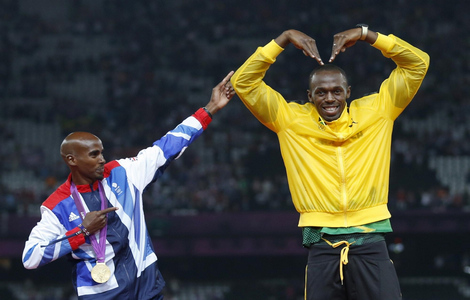
LONDON - When Britain's Stoke Mandeville hospital staged its first sporting contest for disabled patients in 1948 it hoped to show soldiers injured World War II that a broken back did not have to mean a death sentence.
Since then, staff have seen those early games transformed into a Paralympic showcase now in its 14th and largest edition in Britain, mirroring wider progress in the perception of disability around the world.
Now, with governments seeking to cut public spending, doctors and paralympians are hoping the sight of 4,280 athletes from 164 countries competing in front of packed stadia will help maintain that momentum.
One person who could go a long way towards further changing the perception of disability is the eloquent and engaging South African Oscar Pistorius, who competed as a double amputee almost four weeks ago in the Olympic Games to a rapturous welcome.
Dubbed the "Blade Runner" for the two carbon fibre prosthetic blades he uses, Pistorius was named by Time magazine in its 2008 list of the world's 100 most influential people as being "on the cusp of a paradigm shift in which disability becomes ability, disadvantage becomes advantage".
His appearance on the track at the London Olympics, in which the 25-year-old reached the men's 400 meter semifinals, was particularly influential, showing how disabled athletes could perform on the mainstream stage and earning praise from some of athletics' biggest stars.
Much in the same way as the success of athletes at the Olympic Games raised questions over wider issues such as funding for sport, paralympians are hoping a successful staging of their Games will do the same for disability issues.
"Great Britain is at the forefront in terms of education on disability," Pistorius, who was born without a fibula in both legs, told reporters ahead of the Paralympic Games. "I believe that's the only way to remove a lot of the stigmas, and to get over this being a taboo subject.
"The worldwide audience will be amazed when we see these Games through the eyes of the people in the UK. The impact will be phenomenal."
Spiritual home
The Paralympics were conceived at the 1948 London Olympics by German neurologist Ludwig Guttmann, who four years earlier opened a spinal injuries center at Stoke Mandeville hospital to the northwest of London after fleeing Nazi Germany.
Disgusted at the sight of men dying from unrelated infections on average three months after breaking their back, Guttmann worked to make his patients more mobile before gradually introducing sports such as archery and javelin throwing as part of their rehabilitation.
Allison Graham, a consultant physician at Stoke Mandeville's national spinal injuries center, told Reuters it had been incredible to see how much had changed since Britain last held the Paralympic Games in 1984 "in the back garden with one photographer and Prince Charles watching".
"What Guttmann was doing from 1944 onwards was making sure that people could live with a spinal cord injury," she told Reuters. "And it wasn't just enough that they lived, they had to live well."
According to the World Health Organization, more than a billion people in the world experience disability of some kind, and they generally have poorer health, lower education, fewer economic opportunities and higher rates of poverty than those without disabilities.
While Britain and Nordic countries lead the way in terms of access and support, other countries that have made good progress include those hit by war which have improved services for disabled people who returned home as heroes.
Japan, faced with an ageing population, has worked hard to promote accessibility, while in Africa, Uganda is one of the most progressive countries with a reference to the rights of the disabled in its constitution.
Altogether, 119 countries have ratified the United Nations Convention on the Rights of Persons with Disabilities, with many realising that to invest in accessible infrastructure from trains to roads and buildings can be cheaper in the long run, especially in emerging markets where much is yet to be built.
The sight of Pistorius with his blades may also remind governments of the importance of providing the right equipment. The WHO estimates that less than 15 percent of people who need wheelchairs have access to them.
"If people are dependent then they're not earning, they're not producing, they're not paying taxes," Doctor Tom Shakespeare at the World Health Organisation told Reuters.
"They're probably a cost to society, whereas if you remove some of the barriers so they can contribute and participate, then ultimately it will change for the better."
Leading disabled figures in Britain including Paralympian Tanni Grey-Thompson have said that despite London hosting the biggest ever Games, they fear a step back as moves by the government to cut spending result in growing resentment towards the disabled in terms of the benefits they receive.
For Jonathan Fogerty, the chairman of the Spinal Injuries Association, the Olympic Park in London showed how a city should be built, with trains, restaurants, toilets and venues all designed to provide easy access for wheelchair users.
"I went as a wheelchair user and it was excellent," he told Reuters. "Hopefully these Games can leave a legacy of inclusivity and of getting people thinking more widely about the needs and the requirements of those with disabilities. It's not rocket science, it just takes a bit of thought."







